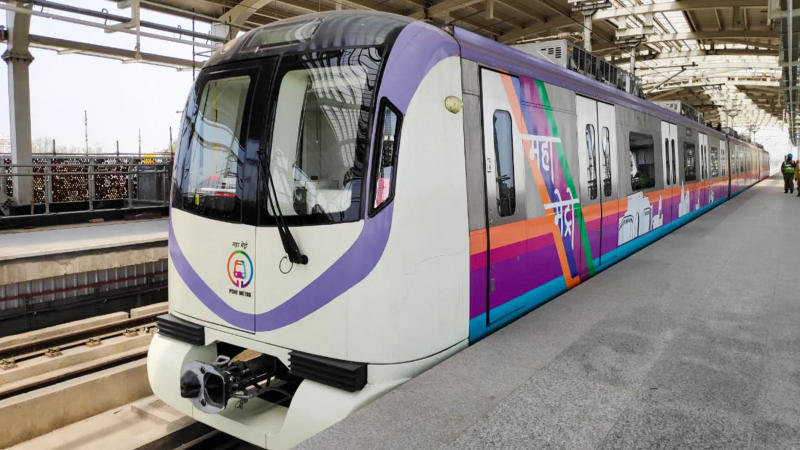Published 13:02 IST, December 19th 2024
Good News for Commuters: Pune Metro to Connect Hinjawadi-Kharadi
Good news for all the commuters, officegoers, the working class, and students, as Pune Metro plans to expand its network connecting Hinjawadi-Kharadi

Pune: Good news for all the commuters, officegoers, the working class, and students, as Pune Metro plans to expand its network connecting Hinjawadi-Kharadi to boost overall economic growth and ease of transportation, avoiding traffic jams, etc.
A significant announcement was made by the officials of Pune IT City Metro Rail Limited (PITCMRL) during an event. The announcement concerns ongoing efforts to connect two major IT hubs in Pune—Hinjawadi and Kharadi—through the Pune Metro system. This initiative is particularly important for the growing IT sector in the city and promises to bring a host of benefits to both employees and businesses in the region.
Key Features and Details of the Pune Metro Expansion:
Connectivity Between Key IT Hubs (Hinjawadi & Kharadi):
The metro line between Hinjawadi and Kharadi will link two of Pune's most significant IT parks, improving connectivity for the thousands of professionals who work in these areas.
This connection is expected to improve commute times and reduce traffic congestion, which is often a significant challenge for workers travelling between these hubs.
Public-Private Partnership (PPP) Model:
The metro project between Shivajinagar and Hinjawadi is being implemented on a PPP basis, with collaboration from a German private company. This partnership ensures international expertise and the infusion of modern technologies in the metro system.
The total cost of the project is estimated at Rs. 7,000 crore, a significant investment aimed at improving public infrastructure in Pune.
Land Acquisition and Project Implementation:
As per the standard procedure, the foundation work for the project will begin only after 90% of the required land is acquired, ensuring that the project proceeds smoothly without major delays due to land acquisition issues.
The project takes into account geographical conditions, citizens' interests, and economic viability during the planning phase, which indicates that the project is being executed with careful consideration of local factors.
Technology and Innovation in Metro Services:
Automated Facilities: Pune’s metro system is adopting modern technologies, including automated facilities designed to make travel more convenient and efficient. The adoption of advanced tech will ensure better service and operational efficiency.
High-Voltage Electric Power and Third-Rail Technology: Unlike traditional metro systems that use overhead electric wires, Pune's metro will use third-rail technology for power, improving aesthetics and reducing safety risks.
Modern Design Features: The metro stations and coaches will include full-glass windows and glass doors, enhancing both safety and the overall experience for passengers.
Focus on Passenger Comfort and Safety:
The metro expansion project is designed with the passenger experience in mind. Efforts to make the metro a safe, efficient, and convenient mode of transport are central to the project’s objectives.
Neha Pandit emphasised that the success of the metro system depends on citizens' adoption. If people choose the metro for its convenience and safety, it will contribute effectively to easing Pune's traffic woes.
Pune Metro Projects:
Drawing inspiration from global metro systems, Pune's metro will implement features like remote sensing, which is commonly used in foreign metro systems for monitoring and maintenance. This will help maintain the system’s efficiency and minimise downtime.
Benefits of the Metro Expansion for IT Professionals and Pune Citizens:
Reduced Traffic Congestion:
The metro will provide an alternative to road transport, potentially alleviating the heavy traffic jams faced by IT professionals commuting between Hinjawadi and Kharadi.
Time Efficiency:
The project will significantly reduce commute times, providing a faster, more reliable mode of transport compared to current road-based options.
Environmentally Friendly:
By shifting more commuters to metro services, the project will help reduce the number of cars on the road, thus lowering carbon emissions and promoting sustainable urban mobility.
Economic Growth:
With improved infrastructure, businesses in the IT sector, as well as other sectors in Pune, will benefit from increased productivity due to better employee commuting options. It will also enhance Pune's appeal as a business hub.
Enhanced Commuter Safety:
The use of modern technologies like third-rail systems and automated services ensures both safety and reliability for commuters. The metro system will be designed to meet international standards of safety.
Employment Opportunities:
The metro expansion project will create numerous jobs, both during construction and in the long-term operation of the system.
The connection between Hinjawadi and Kharadi is just one part of a larger plan to expand the city's metro network, offering significant advantages for commuters, businesses, and the environment.
Updated 13:02 IST, December 19th 2024




